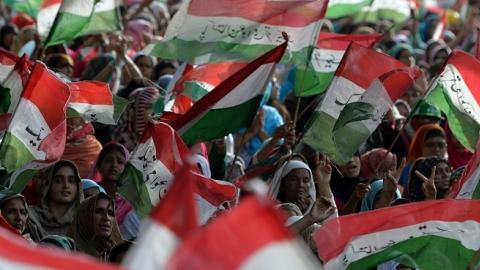NATIONS, like individuals, can often be swayed by emotion in defining their self-interest. Soon after independence, Pakistan’s leaders determined that the country’s military and economic needs would be better served with a Cold War alliance with the West. But the national sentiment favoured pursuing the dream of pan-Islamism. Religious passions, always easy to arouse, have held the country hostage since its inception and their intensity has only risen over time.
Prime Minister Huseyn Shaheed Suhrawardy, from Bengal, came under fire for suggesting that an alliance of Islamic countries would not enhance Pakistan’s security needs because “zero plus zero is equal to zero”. Several national leaders, beginning with Suhrawardy, have been castigated for advising Pakistanis against confrontation with India.
It is easy to reject ideas, however reasonable, on grounds that they do not conform to Pakistan’s Islamic ideology or because they would detract from the country’s raison d’être. This allows influential groups to exploit popular emotions to maintain policies that favour their vested interests. Militarism and militancy have dominated Pakistan’s choices even as they brought no advantage in enhancing national security or prosperity.
A major consequence of the preoccupation with ideology has been to create the dichotomy of increased dependence on the very donors whom Pakistanis love to hate but whose assistance is crucial in maintaining an expansive national security state.
Pakistan is, of course, not the only nation where rhetoric trumps cold calculation of national interest. Only recently Greece elected a government which reflected the nation’s anger against European demands for austerity and restraint. Prime Minister Alexis Tsipras made defiant statements against Germany at a time when his country most needed German support in getting out of a debt crisis.
As one observer pointed out, his poll ratings rose as a result of the grandstanding even though bank deposits in Greece fell, further aggravating the country’s economic crisis. Defiant statements won Tsipras applause from his fellow countrymen but the net impact of these statements on the national economy was negative.
Compare such emotion-based decision-making with the conduct of East Asian nations including China and South Korea. After years of describing the United States as the centre of global imperialism, the Chinese Communist Party had no qualms about partnering with the Americans to modernise and expand China’s economy. The South Koreans built a self-sustaining economy with a cumulative aid input from the US of only $15 billion since 1950 by avoiding confrontation with America and by cooperating with erstwhile enemy Japan.
Pakistan received $40bn in bilateral US aid over the same period. Instead of utilising aid as a catalyst for indigenous growth, Pakistan has ended up becoming dependent on it. Donor funding serves as a substitute for revenue generation while wars and terrorism have deterred investment.
On the one hand, Pakistanis are motivated by the notion of national honour in refusing to trade with India until the Kashmir dispute is resolved. On the other, we remain dependent on others to pay our bills. Government officials celebrate whenever one of Pakistan’s foreign benefactors approves a loan instead of regretting the fact of having to borrow so much so often.
Securing Kashmir, balancing India and dominating Afghanistan are Pakistan’s ideological obsessions even though pragmatic considerations necessitate a course correction. For instance, Pakistan could adopt an approach to Kashmir similar to that of China over Taiwan. It doesn’t need to give up its claim, but it could move on other issues with India first. Chinese president Jiang Zemin suggested as much in his address to Pakistan’s Senate in December 1996. Opening trade with India could bolster Pakistan’s economy while buying electricity from across the border could alleviate power shortages.
In any case, realism demands recognition of the fact that Pakistan no longer enjoys the support of the international community on the Kashmir issue. Last year, Prime Minister Nawaz Sharif was the only head of government to mention Kashmir among 193 that spoke at the United Nations General Assembly. Yet, our leaders refuse to budge from their stance that Kashmir is the core issue in India-Pakistan relations. Ideology and pride come in the way of charting a sensible course.
Similarly, Pakistan could befriend the government in Kabul to ensure that Afghan territory is not used to support ethnic insurgents against Pakistan instead of insisting on demanding a say in who rules Afghanistan. But Pakistani officials remained suspicious of former president Hamid Karzai and refuse to shut down the Afghan Taliban even after the recent bonhomie with President Ashraf Ghani.
Terrorism has cast a long shadow on India-Pakistan relations since 1989 and also jeopardises Pakistan’s relations with the West. But Pakistan’s establishment refuses to completely give up the option of sub-conventional warfare, which it sees as a force multiplier and influence enhancer. To give up jihad is anathema to the noisy Islamists who can be counted on to launch fatwas against anyone who suggests that the national interest requires focusing on economic growth rather than settling disputes with neighbours by force.
It is true that the Peshawar school attack has prompted Pakistan’s military to speed up action against terrorist groups responsible for mayhem inside the country. The military’s Operation Zarb-i-Azb has destroyed the Tehreek-i-Taliban Pakistan safe haven in North Waziristan, which has also disrupted some external jihadi groups that shared that safe haven. But there has been no move whatsoever against Kashmir-oriented jihadi groups.
It seems that changing Pakistan’s discourse is a prerequisite for changing its course. Pakistan views itself as an ideological state in a state of permanent conflict with India — a vision that enhances the military’s dominance, keeps Islamists politically assertive and enables certain economic interests to prevail. Someone must now lead Pakistan into visualising itself as a pragmatic territorial state that focuses on the security and prosperity of its people.















